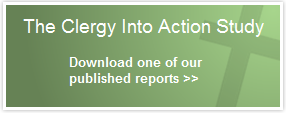One of the fundamental tasks of ordained ministry is lifting up a vision of God, God’s redemptive work, and the good toward which God calls humanity. This task is deeply theological, but it must speak from the heart of the ordained minister, and it must also speak directly from and to the lives of those in the community the ordained minister serves.
So, a pastor/priest must learn how to speak theologically in a way that gives voice to his own passionate concerns and commitments for the Gospel. But a pastor/priest must also learn how to discern and give voice to the theology of the local faith community he serves. Both are challenging tasks, and require deep listening, observing, thoughtful reflection, and playful experimentation.
Unfortunately, these challenges are rarely fully addressed in seminary and divinity school education. Even in the best of circumstances, they are not always fully addressed through continuing post-seminary training and development.
More than 80% of pastors and priests from post-seminary Transition into Ministry (TiM) programs indicated that their TiM programs helped them (intermittently or strongly) learn how to claim and embrace their own theological voice as individuals—and over 45% said their TiM programs were strongly and steadily helpful.
In contrast, less than 60% of TiM alumni pastors and priests said their TiM programs helped them learn how to speak the theological voice of the faith community—and fewer than 25% indicated that their TiM programs were strongly and steadily helpful in emphasizing this theological capacity.
It seems that new clergy—and the post-seminary programs that support their continuing development—focus more on the deeply internal work of finding their own theological voice, and in the process give less attention to the intensely social and interpersonal work of discovering and embracing the theological voice of the faith communities they serve.
It is certainly crucial for clergy to be able to speak with authenticity, passion, and directness about theological and spiritual matters—to show how they really do matter to them as leaders and as followers of Christ. But it is at least equally important to be able to name those things that are theologically and spiritually at the heart of the Christian communities they serve. Otherwise, they run the risk of becoming relevant only to themselves. Even worse, they run the risk of missing the point of what is at the heart of the faith communities they serve and lead.
For Your Consideration
- What happens when a pastor/priest can speak with clarity about his own theological ideals and passions, but cannot give clear voice to the theological ideals and passions of the faith community he serves?
- What happens when a pastor/priest cannot clearly voice either her own theological ideals and passions or those of the faith community she serves?
Related Article
- Research: How Do Clergy Communicate Core Ideas?



